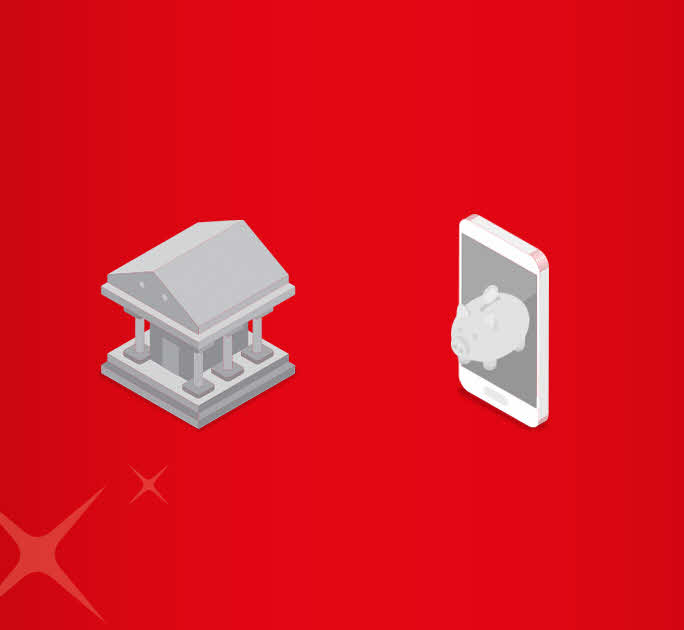- Save
- Invest
- Borrow
- Pay
- More
- Customer Services

NEFT vs IMPS: Understand the Difference
Key Takeaways
- There are multiple methods of transferring money online like NEFT, IMPS, and RTGS.
- IMPS and NEFT are both 24x7 services to transfer funds electronically from one bank to another.
- The key difference between NEFT and IMPS is the way in which each transaction is processed.
- The payment option that is most suitable for you completely depends on your need and the purpose of the transfer.
Introduction
The technological advancement in the Banking Industry has allowed banks to provide various payment systems in India. Today, the process of sending money from one bank account to another is easier and faster than ever, thanks to facilities like IMPS, NEFT, and RTGS. You can choose any of these methods of fund transfers based on the amount you wish to transfer. Of the three methods of fund transfers, NEFT and IMPS are used significantly by account holders in India. Let us understand what a NEFT transfer and what an IMPS transfer are, along with the difference between IMPS and NEFT.
What is a NEFT transfer?
NEFT (National Electronic Funds Transfer) is an electronic payment system used in India to transfer money from one bank account to another. It operates in batches and allows individuals, businesses, and organizations to send funds securely between banks.
Key Features of NEFT
- Processing Time: Transactions are settled in half-hourly batches.
- Availability: NEFT is available 24/7, including weekends and holidays.
- No Minimum Limit: There is no minimum transaction amount, making it ideal for small and large transfers.
- Bank Requirement: Both the sender and recipient must have accounts in NEFT-enabled banks.
- Transfer Time: Usually takes half an hour but may take longer depending on bank processing.
To initiate an NEFT transfer, you need the recipient’s name, bank account number, IFSC code, and bank name. It is widely used for personal and business transactions due to its reliability and security.
Also Read :- NEFT Timings – An Overview
What is an IMPS Transfer?
IMPS (Immediate Payment Service) is an instant electronic funds transfer system in India that allows users to send and receive money 24/7, including weekends and bank holidays. It is a fast, secure, and widely used payment method for urgent transactions.
Key Features of IMPS:
- Instant Transfer – Funds are credited immediately to the recipient’s account.
- Available 24/7 – Works anytime, including bank holidays.
- Multiple Transfer Modes – Can be done via mobile banking, internet banking, ATM, or bank branch.
- Secure & Reliable – Requires authentication via OTP, MPIN, or internet banking credentials.
Minimal Details Required – You can transfer money using:
- Account Number & IFSC Code
- Mobile Number & MMID (Mobile Money Identifier)
- Aadhaar Number (if linked to the bank account)
- IMPS Transaction Limits & Charges
- Minimum Amount – ₹1
- Maximum Limit – Usually up to ₹5 lakh (varies by bank)
IMPS is ideal for urgent transfers, e-commerce payments, and utility bill payments due to its speed and ease of use.
NEFT vs IMPS - The differences
The National Electronic Funds Transfer or NEFT transfer and Immediate Payment Service or IMPS transfer are both 24x7 services that enable you to transfer funds electronically from one bank to another. NEFT is a centralised payment system operated by the Reserve Bank of India (RBI), whereas IMPS is a money transfer service managed by the National Payments Corporation of India (NPCI). Both methods of fund transfer are safe and fall under the purview of the Reserve Bank of India. While there are some fundamental differences between IMPS and NEFT, your purpose or need for sending the money will determine which is better – IMPS or NEFT.
Differences between NEFT and IMPS
IMPS and NEFT transactions primarily differ based on four factors, as mentioned below.
|
Category |
NEFT |
IMPS |
|
Transaction Charges |
No NEFT charges at DBS Bank (charges may apply with other banks) |
No IMPS charges at DBS Bank (charges may apply with other banks) |
|
Transaction Timings |
Available 24x7, but processed in batches (typically within 2 hours). |
Available 24x7, real-time processing. |
|
Maximum Fund Transfer Limit |
No maximum transaction limit. |
Maximum limit per transaction: INR 2,00,000. |
|
Service Availability |
Available online and offline (branch). |
Available only online. |
Open Savings Account
in 3 easy steps
Aadhar Card + PAN Card + Video KYC
= Account opened!
IMPS or NEFT which is better?
Every money transfer method fulfils some specific needs and requirements of the customers and their beneficiaries. The payment option that best suits you ultimately depend on your need and the purpose of the transfer. For instance, let us say you are responsible for the financial upkeep of your parents residing in a different city. You wish to send them money each month. You can use both NEFT and IMPS. Now, if your parents need money urgently, you can utilise the IMPS fund transfer method due to the instant transfer facility. However, if they can wait for the fund transfer, and if you do not wish to bear the transaction charges associated with IMPS, you can opt for the NEFT fund transfer method.
Every money transfer method fulfils specific needs and requirements of customers and their beneficiaries. The payment option that best suits you ultimately depends on your need and the purpose of the transfer. For instance, let us say you are responsible for the financial upkeep of your parents residing in a different city. You wish to send them money each month. You can use both NEFT or IMPS. Now, if your parents need money urgently, you can utilise the IMPS transfer method due to the instant transfer facility. However, if they can wait for the fund transfer and you do not wish to bear the IMPS vs NEFT charges, you can opt for the NEFT transfer method.
With the digibank by DBS app, you get access to all the money transfer options at your fingertips. Download the app to get started and even open your savings account with us.














